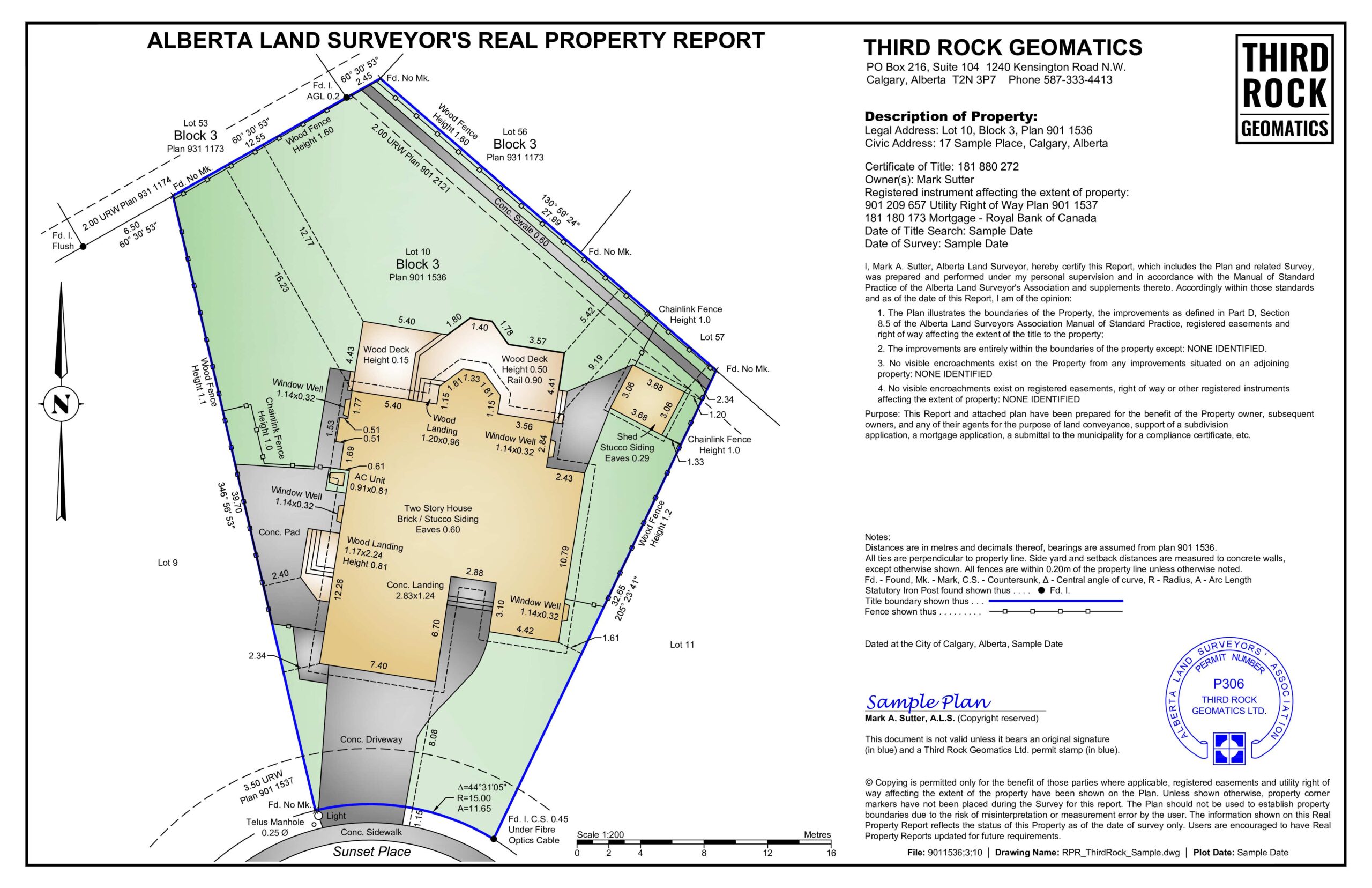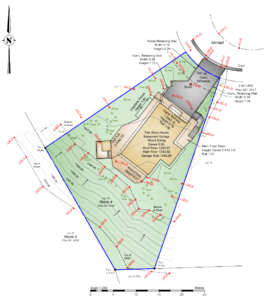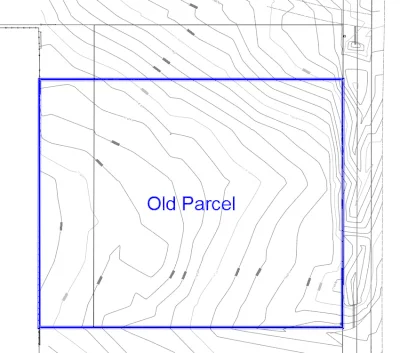A Real Property Report doesn’t “expire” like a driver’s license. It’s a snapshot of your property on the day a licensed surveyor signs it.
Over time, properties change — and bylaws do too — so an older RPR can become unacceptable in a sale or permit process. Below, we explain what “valid” really means in Alberta, when you’ll need an update, and how to move quickly with clear next steps.
What is a Real Property Report (RPR) and Why is It Important?
Before we discuss validity, it helps to understand what an RPR shows and why buyers, lenders, lawyers, and municipalities rely on it.
Understanding the Basics of a Real Property Report
A Real Property Report is a legal document prepared by a licensed Alberta Land Surveyor. It shows all visible, permanent improvements — house, garage, decks, fences, sheds, and more — relative to property boundaries, and notes encroachments and easements.
When requested, the RPR is submitted to the Municipality for a compliance review, which may return a compliance stamp or notes requiring next steps.
See: How To Get a Calgary Real Property Report (RPR)
How to Know How Long An RPR is Valid for in Alberta
Strictly speaking, an RPR doesn’t “expire.” It records a point in time. But an RPR can become too old to rely on if site conditions have changed (e.g., new deck, fence, shed, AC) or bylaws have changed since signing.
Another factor is the willingness of the purchaser’s lawyer to accept an older RPR in the transaction. Nothing may have changed, but the purchaser’s lawyer may decide they want a new plan. The 20-year-old plan is not acceptable to them.
Neighbouring improvements may also affect your interests — and your lawyer may not consider the issue of a neighbour impeding on your rights by encroaching on your property with a garage, eave, or sidewalk if the issue is not raised by a land surveyor.
As land surveyor Mark Sutter puts it: “An RPR starts aging the moment I sign it.”
Navigating Real Property Reports in Calgary and Alberta
Regional expectations are similar — municipalities review RPRs for bylaw compliance and may issue advisories or require permits — but Calgary has some well-known nuances captured in our guides.
Use the following as a practical orientation for common scenarios.
Real Property Reports in Calgary
In Calgary real estate sales, there is a typical expectation of a current RPR plus a City compliance certificate.
The City’s review checks structure placements relative to property lines, easements, and setbacks — not construction quality or building permits.
Common triggers that necessitate updates include new decks (especially those 60 cm or higher), moved or rebuilt fences, AC units, pads, sheds near easements, pergolas (especially if they are greater than 10m. sq.), and retaining walls.
Real Property Reports Throughout Alberta
An up-to-date Real Property Report provides clarity and transparency across Alberta by confirming what sits where on a parcel and highlighting any encroachments or easements that may affect a transaction.
Because expectations can vary by municipality and practice, homeowners should consult a local Alberta land surveyor to understand regional norms among lawyers and realtors before listing or closing.
Steps to Obtain a Real Property Report
If you’re selling, refinancing, or applying for permits, ordering early reduces stress. The steps below reflect our recommended workflow.
The Process of Getting a Property Survey
An RPR is more than a box to tick. Providing an up-to-date RPR to your realtor can fulfill contractual obligations and gives you control over your deal:
- Order your RPR and provide property address, reason/timeline, and contact info.
- We research registered survey plans and review the title for interests affecting your parcel.
- A crew locates and verifies survey evidence on and around your block.
- We draft and certify the RPR.
- We submit it to the City for a compliance review.
- We deliver your RPR and advise on any next steps (e.g., encroachment agreement or development permit).
Do You Need a Survey on Your House Before Selling?
In practice, yes — order early.
Stakeholders in a sale commonly expect an up-to-date RPR with municipal compliance. This reduces last-minute renegotiations and prevents a “red stamp” surprise near closing.
See: Do You Need an RPR To Sell a House in Alberta?
Can You Update an Existing RPR Without Ordering a New One?
In Alberta, only the surveyor who originally signed your RPR can issue an official update to that plan. If a different firm is engaged, they must complete their own fieldwork and produce a new RPR — otherwise they risk assuming the original surveyor’s professional liability.
Practically, this means updates are feasible when you return to the original author; switching firms typically requires a fresh report.
Costs and Considerations for Real Property Reports
Cost and timing hinge on what your RPR shows — boundaries, structures, easements, and any encroachments — and whether municipal compliance is required. Clear, straightforward plans move quickly; issues flagged on the RPR may add steps and time.
Real Property Report Cost in Calgary and Beyond
Pricing depends on property complexity and service level. A standard RPR in Calgary typically ranges from $600 to $900, with costs increasing for large or irregular lots, older neighbourhoods with complex survey evidence, and sites with many structures.
Rush services and add‑ons (e.g., boundary staking) can raise the price. Practical drivers that affect both budget and timeline include the number of improvements to document, the complexity of utility/municipal easements, past renovations, and whether compliance or encroachment issues must be resolved.
How to Read a Real Property Report
Use these cues to interpret your plan quickly and spot anything that could affect cost or timing:
-
- Title Block & Dates: Confirm legal/civic address, title details, survey date, and certification.
-
- Boundaries & Dimensions: Use lot lines and measurements to understand legal limits.
-
- Improvements & Distances to Lines: See where houses, garages, decks, sheds, and fences sit relative to boundaries.
-
- Easements/URWs: Dashed corridors that restrict what can be built or kept in place.
-
- Encroachments & Notes: Identify crossings into lines/easements and read plan notes/legend for clarifications.
-
- Compliance & Surveyor’s Certification: The RPR is certified by a licensed surveyor; municipalities separately issue compliance decisions.
For more information on how to read and interpret an RPR, see: How to Read an RPR.
Maximizing Property Value With Accurate Surveys
A current, compliant RPR gives buyers, lenders, and lawyers confidence, reducing risk and smoothing negotiations.
Ensuring Compliance and Value
A current RPR with municipal compliance reduces uncertainty, shortens negotiations, and protects both sides. Buyers and banks rely on it to confirm boundaries, improvements, and any limitations or required next steps, such as encroachment agreements or development permits.
Sheds, Fences, and Structures on Your Property
The need to obtain a new RPR can be triggered by site changes since the last RPR, which may include new or relocated fences, elevated decks, AC units, pads, sheds near utility or drainage easements, pergolas attached or unattached to the house, and retaining walls. Neighbouring changes may also matter.
If anything has changed — or your RPR predates notable bylaw shifts — plan on ordering a new or updated report.
Why Choose Third Rock Geomatics for Your Real Property Report Needs?
Choosing the right surveyor impacts speed, clarity, and how confidently your transaction moves forward. We offer fixed pricing, transparent timelines, and direct access to a licensed surveyor — so you’re never left guessing.
Serving Alberta With Trusted RPR Services
-
- Speed you can plan around, with clear communication at each step.
-
- Fixed, all‑in quoting to avoid add‑ons and surprises.
-
- Easy‑to‑read plans designed for homeowners, realtors, and lawyers, plus City submission on request.
Tip: Order your RPR as soon as you consider selling, not just when a deal is pending.
Third Rock Geomatics completes most RPRs within 3–5 business days, including submission to the city for compliance review.
Don’t leave your home sale to chance or risk a deal falling through. Contact us today for fast, expert help with your Real Property Report in Alberta.
This resource is intended to inform Alberta homeowners and sellers about RPR requirements. For advice about your unique property or transaction details, speak with a qualified land surveyor or your real estate lawyer.





